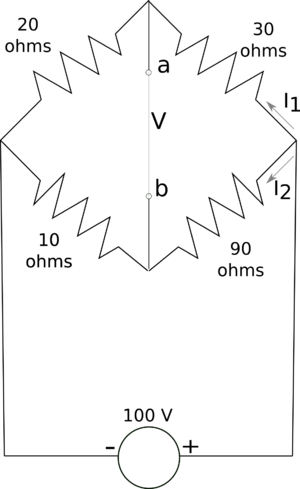Difference between revisions of "106MT2Pr-solutions"
| Line 16: | Line 16: | ||
The Thévenin equivalent circuit is then a 30V source connected in series with a 21 Ohms resistor. | The Thévenin equivalent circuit is then a 30V source connected in series with a 21 Ohms resistor. | ||
| − | [[File:106MT2-bridge- | + | [[File:106MT2-bridge-v2s3.png|thumb|center|Thévenin equivalent circuit]] |
==Question 2== | ==Question 2== | ||
Revision as of 17:26, 24 April 2019
Question 1
The first step in the Thévenin equivalent circuit approach is to remove the capacitor, and calculate the open circuit voltage between a and b.
The second step is to calculate the equivalent resistance by reducing the voltage to zero and calculating the resistance between a and b
The Thévenin equivalent circuit is then a 30V source connected in series with a 21 Ohms resistor.
Question 2
(a) The normal component of must be zero.
(b) To find the field outside the superconductor, we place an "image dipole" inside the superconductor a depth below the surface, oriented at an angle () from vertical. This automatically satisfies the boundary condition. The field outside the superconductor is the field due to the original dipole and the image dipole.
(c) Taking the -axis normal to , parallel to the superconducting sheet, and into the page:
(d) Stable equilibria: , . Unstable equilibria: ,
(e) away from the superconductor.


















